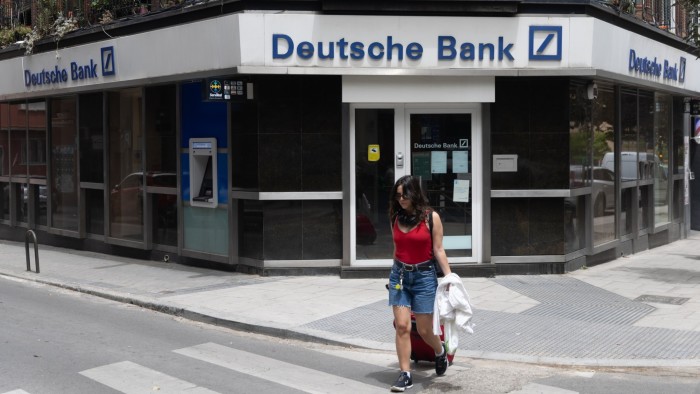Unlock the Editor’s Digest for free
Roula Khalaf, Editor of the FT, selects her favourite stories in this weekly newsletter.
Spain’s financial market watchdog has fined Deutsche Bank €10mn over the mis-selling of risky foreign exchange derivatives, as the lender grapples with long-standing misconduct in its Spanish division.
Spain’s National Securities Market Commission (CNMV) accused Germany’s largest lender of “very serious infringements” of Spanish and EU law, and said it failed to inform corporate clients properly about the risks associated with derivatives products that exposed them to heavy losses.
CNMV imposed the third-largest fine in its history and suspended Deutsche Bank from conducting investment advisory activity related to the products for a year, saying the bank failed to act in the best interests of clients.
Deutsche Bank said it had “improved our processes and enhanced our controls”, and would appeal against the ruling.
The regulator found that the alleged mis-selling took place between 2018 and 2021, meaning that it continued even after Deutsche Bank started an internal investigation in 2019 following a whistleblower complaint.
The foreign-exchange derivatives were sold to small and medium-sized companies who wanted to hedge foreign exchange risk, without properly informing them about the risk of losses. Some buyers lost millions of euros from the contracts, pushing them close to insolvency.
Deutsche Bank’s own probe, called “Project Teal”, found that its staff acted disingenuously, broke EU rules and exploited flaws in the bank’s controls. It later replaced some of the management staff in Spain, as well as senior investment bankers in London. The bank paid millions of euros in settlements to some clients, including a winemaker and a hotel chain.
In one case, a family-owned fruit and vegetable wholesaler with €3mn in annual sales was sold derivatives covering €19mn of foreign exchange exposure over the five years to 2023.
CNMV announced the investigation in January 2024 and said banks had a duty to inform investors in a “balanced, clear, impartial and non-misleading manner” about the risks of certain products that they were selling. It said this was particularly so when such products were “very complex” and banks had a duty to ensure they met clients’ needs and risk profiles.
Additional reporting by Carmen Muela
https://www.ft.com/content/ec6833b1-ae87-47ff-9ffe-e5cc3dbc293f


